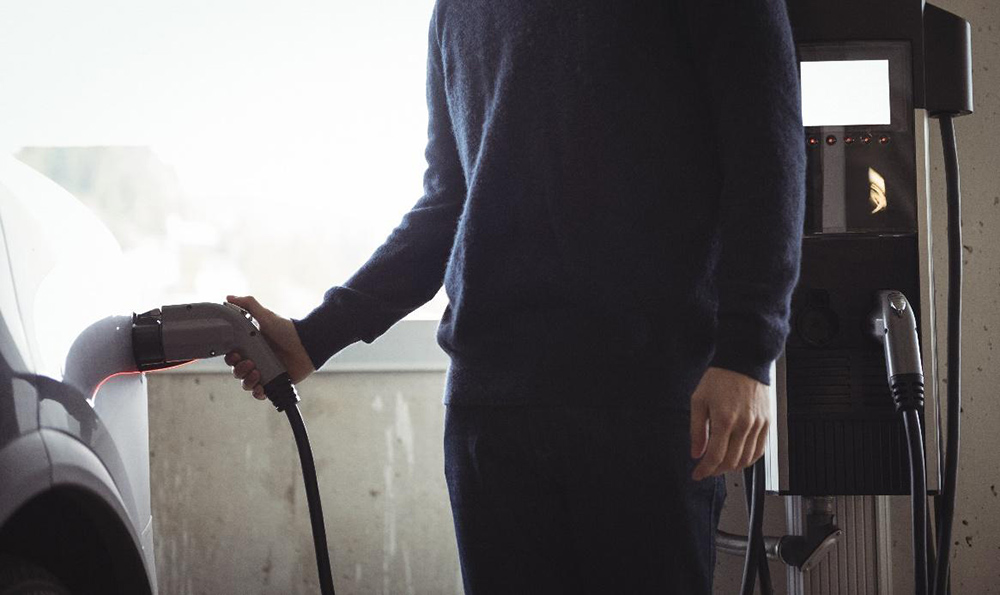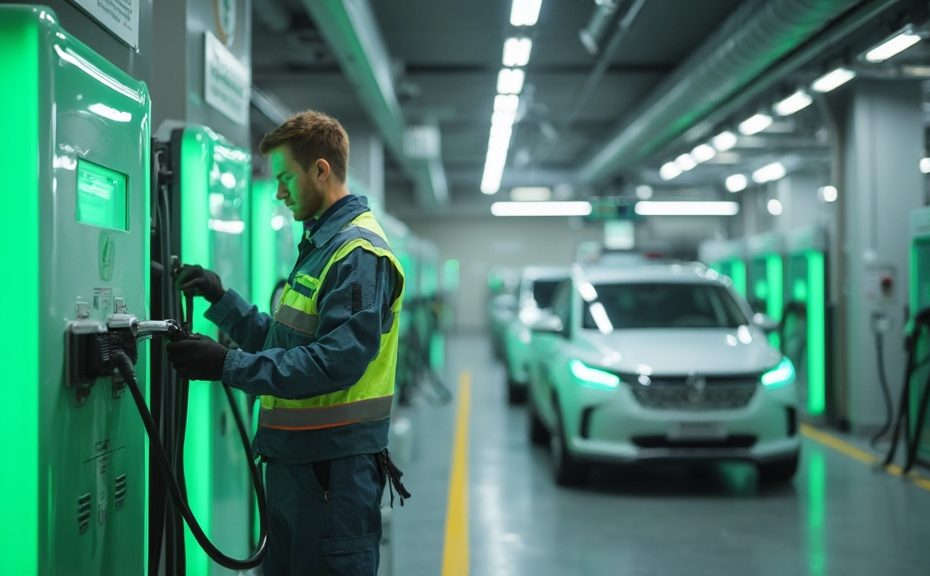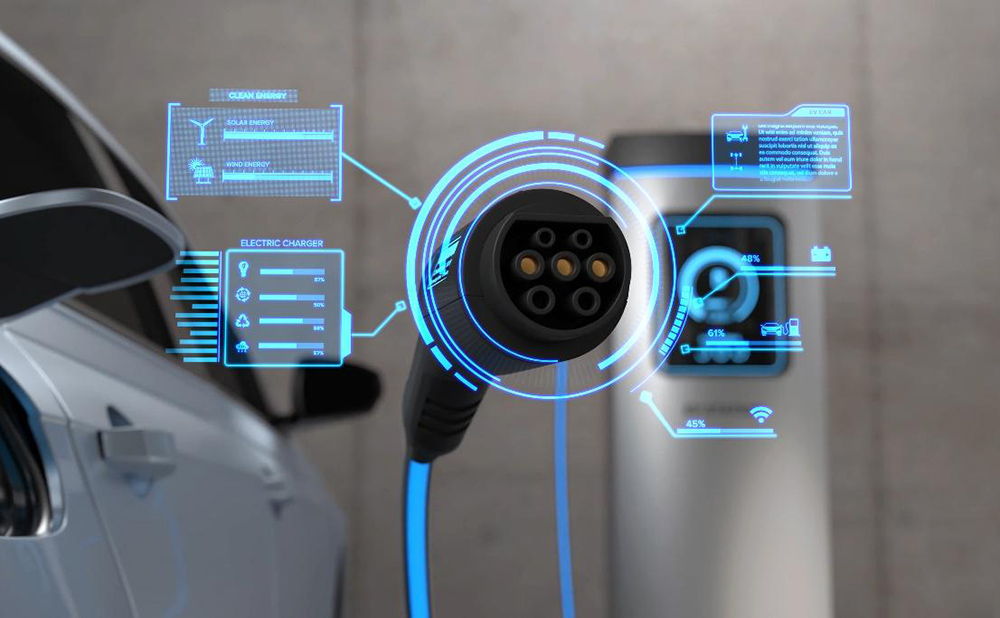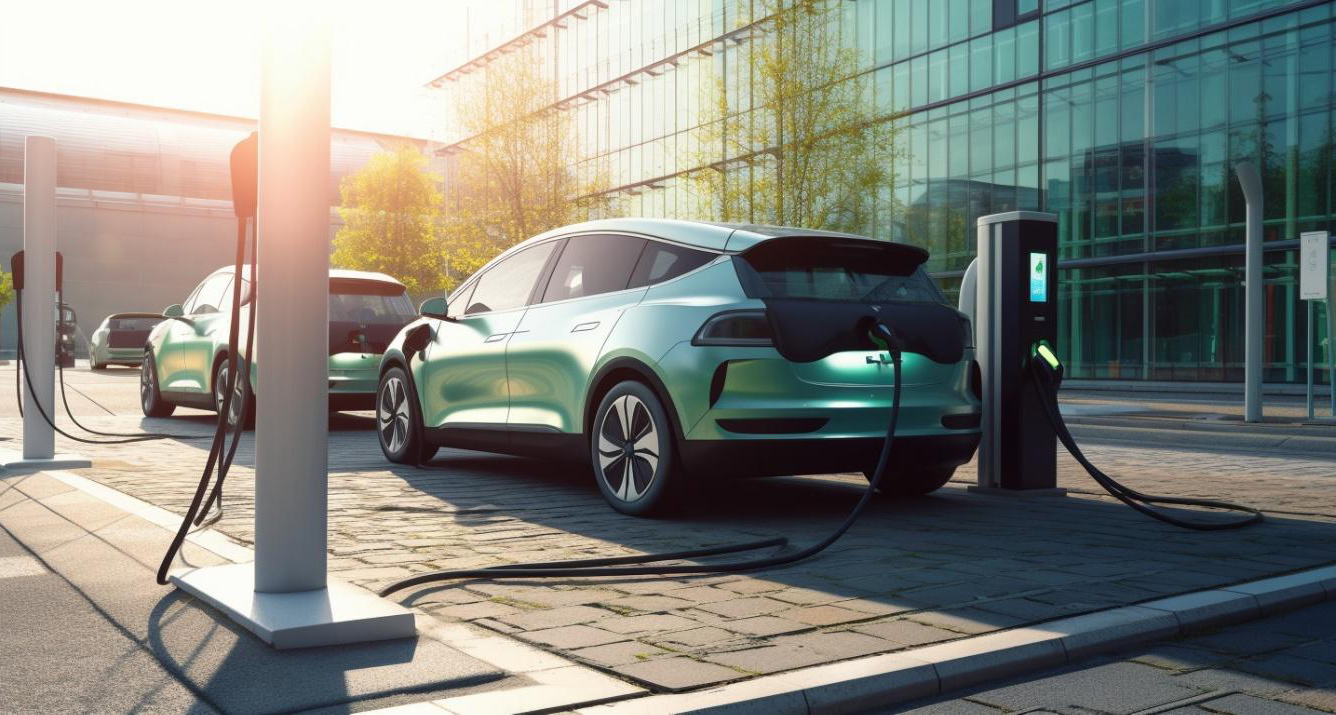Summary
Installing commercial electric vehicle (EV) chargers boosts property value, attracts customers, and generates new revenue streams. Success depends on hiring qualified electricians, ensuring regulatory compliance, and planning for future demand. Trusted experts like Tercero Inc. can help businesses stay competitive and sustainable.
Table of Contents
Introduction
Commercial EV charging stations bring numerous benefits to property and business owners. From enhanced property values to new revenue opportunities, your business has much to gain from offering a place for your employees and customers to recharge their cars.
Although the benefits of installing commercial EV chargers are numerous, the prospects of planning and executing an EV charger installation project can be overwhelming. And this is where hiring the right EV charger installation electrician comes in.
In this article, our experts examine the commercial benefits of installing electric vehicle chargers on your property and provide tips for a successful and efficient installation.
Why Businesses Need Commercial EV Charging Stations
Commercial charging stations will not only increase the value of your property but also give your business a boost, along with a range of long-term benefits.
1. Increased Foot Traffic
One of the key benefits of EV charging stations for businesses is the ability to attract more customers to your business. EV drivers are always on the lookout for convenient places to charge their cars, and companies like yours become a natural destination for them.
2. Additional Revenue Streams
Businesses with electric vehicle (EV) chargers can generate passive income by charging customers for the use of their electric charging equipment. Depending on your pricing model and the subscription, you can easily offset installation and maintenance fees.
You can charge a fee based on time spent charging, energy consumed, or a flat rate per session.
3. Future-Proof Your Business
By installing a commercial charging station now, your business can stay ahead of the competition as electric vehicle (EV) adoption increases.
You will also gain a first-mover advantage, which will give you a significant market share. You may also take advantage of government initiatives that can reduce installation costs and may not be available in the future.
4. Higher Property Value
As more people switch to electric vehicles, businesses equipped with electric vehicle (EV) chargers will become increasingly desirable to potential buyers and tenants. This will enable property managers to charge higher fees, providing you with a better return on investment (ROI) than any other business.
5. Sustainability
The benefits of commercial EV charger installation extend beyond revenue increases and convenience. According to commercial electrical companies in Los Angeles, this project can significantly reduce your company’s carbon emissions and help your employees transition to using cleaner transportation.
Choosing the Right Commercial Electrical EV Contractors in Los Angeles

Finding the right electrician for EV chargers can be challenging, especially in a competitive environment like Los Angeles. Here are some tips for choosing the perfect EV charger installation electrician for your project:
1. Look for Experience and Expertise
When searching for commercial electrical companies, experience and expertise should be at the top of your list. Prioritize contractors with an extensive portfolio of past works and specialization in the work you require.
2. Verify Licensing, Insurance, and Certification
Working with an unlicensed or uninsured electrician is a risk you cannot afford to take, especially with a project of this scale and importance. Screen out businesses that don’t have the necessary licensing and documentation required by the state of California.
Insurance coverage protects you from liability in case of accidents.
3. Evaluate Customer Reviews
The reviews and references of electrical EV contractors in Los Angeles speak volumes about the quality of their work and customer service. Check Google and Yelp for unbiased reviews from past customers, paying attention to the themes that emerge in both positive and negative reviews.
4. Compare Pricing
One of the biggest mistakes you can make while choosing a commercial electrical EV station repair and installation company is going for the cheapest option. Focusing on making savings or reducing costs can lead to more expensive repairs in the long run. Instead, focus on a company that offers fair pricing and delivers high value.
5. Confirm Availability and Project Timeline
The right contractor should be able to align with your project’s schedules and meet deadlines on time. Ensure that they provide a dedicated line of communication to fast-track reviews and improve satisfaction.
The Role of an EV Charger Installation Electrician

The responsibility of an electrician for EV charger installations is to ensure that installations meet NEC requirements for EV chargers. The role of an electrician in commercial EV charger installation includes:
1. Ensuring Safety
EV charging systems involve high-voltage equipment and complex distribution systems. A licensed electrician ensures that safety standards are met throughout the design, installation, and maintenance phases of the project.
2. Quality Assurance
An experienced EV electrician ensures that charging solutions are tailored to your needs, helping to optimize efficiency and performance.
3. Effective Service and Installation
The success of your commercial electric vehicle charging station depends on seamless service delivery and installation. An EV charging electrician is equipped with the skills, technologies, and experience to navigate complex challenges from site assessment to electrical panel upgrades and equipment selection.
4. Meeting Compliance Standards
Regulatory compliance is non-negotiable in the installation of EV chargers. An experienced EV charger electrician is well-versed in the regulatory requirements and building regulations required for installing a commercial EV charger. This helps you avoid compliance issues down the road.
Maintenance and Repair of Commercial EV Charging Stations
Commercial electrical EV station repair involves regular inspections, safety checks, parts replacement, and software updates. Key maintenance and repair tasks for commercial EV charging stations include:
1. Routine Inspections
Regular inspections are necessary for keeping things in working order. These inspections include:
- Physical examination: Checking for visible wear and tear, signs of vandalism, and environmental damage.
- Electrical components: Ensuring that all elements, such as connectors, cables, wiring, and internal circuits, are working correctly.
- Software updates: Keeping the station’s software up-to-date to ensure compatibility with the latest EV models and to integrate new features and security patches.
2. Preventive Maintenance
This involves proactive measures to avoid costly repairs. They include:
- Cleaning: Regular wipe downs to prevent the accumulation of dust, dirt, grime, and other substances that can affect the performance of the chargers.
- Component testing: Periodic testing of transformers, circuit breakers, and cooling systems to ensure they are operating within acceptable parameters.
3. Responsive Repairs
Prompt repairs are crucial for minimizing downtime and preventing more severe issues. You should have a maintenance partnership with a professional EV charger installation electrician to ensure quick response and repairs when your system goes down.
Future-Proofing Your Business with EV Charging Solutions

Having an EV charger on your premises helps ensure your business meets expectations in the present while positioning itself for future growth. Future-proofing your business with EV charging solutions involves:
- Assessing current and future demand: Analyze factors such as the types of vehicles your customers or employees drive, average dwell time, charger compatibility, and other relevant considerations.
- Providing space for installing additional chargers to meet the projected future increase in demand.
- Leveraging smart charging technology to optimize charging efficiency and reduce maintenance costs.
Conclusion
Installing a commercial EV charging station on your property is not easy or inexpensive, but the rewards outweigh the costs. The potential benefits for your business include increased foot traffic, additional revenue generation streams, higher property value, improved brand image, and a competitive future. However, obtaining all these benefits is contingent upon hiring the right EV charger installation electrician.
A faulty installation will turn a promising business prospect into a nightmare of sinking debts, inefficient service, and regulatory problems. If you’re considering installing an electric vehicle charger in Los Angeles, contact Tercero Inc. for expert electrical services.
FAQs
Commercial electric vehicle (EV) chargers require significant power to support high-powered charging. Level 2 and DC fast chargers are best for commercial use.
The most common power source for charging stations is the electrical grid.
To start, secure funding from partners, hire the right electrician for EV installations, obtain necessary building permits and licenses, and consider the power sources.
EV charging solutions reduce environmental damage, increase revenue generation, and enhance your company’s reputation.
Business models for EV charging stations include loss leader (offering free charging to attract drivers), cost recovery (setting a bill that covers costs), and profit-making (setting a bill that covers costs and generates profits).
The cost of electric charging stations for businesses ranges from $1,500 to $10,000 for level 2 chargers and $25,000 to $200,000 for level 3 DC fast chargers.
Yes. Some tips include advertising revenues, government grants and tax credits, charging fees, and preventive maintenance, among others.
A level 3 charger ordinarily costs between $25,000 and $200,000, and installation is an additional $25,000 to $100,000 per charger, depending on the extra work required.
The EV charger rule refers to the regulations and guidelines related to the installation, operation, and use of electric vehicle charging stations.
A level 3 charger can add approximately 230 miles of range per hour to an electric vehicle. It can also charge an EV battery to 80% in 30 minutes.

